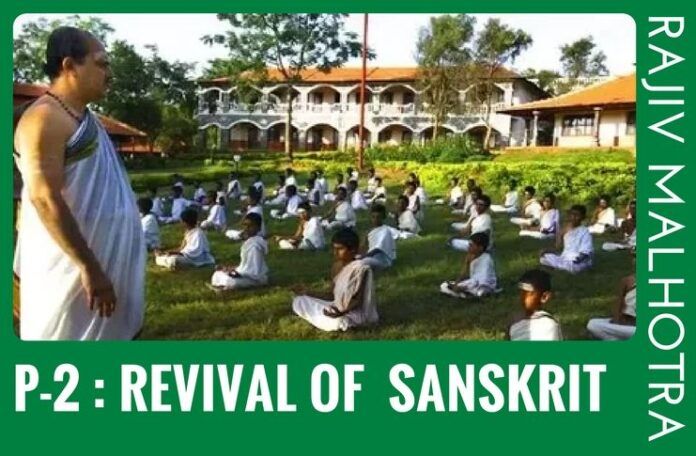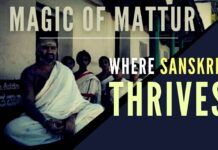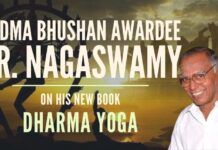
Part 1 of this series can be ‘accessed ‘ here. This is part 2.
In this part, I will look at how others like the Chinese defend their language and then discuss what Shri. Sastry and I saw to be the problems faced when trying to promote Sanskrit.
Chinese Strategy of Defence:
[dropcap color=”#008040″ boxed=”yes” boxed_radius=”8px” class=”” id=””]I[/dropcap] want modern Sanskrit scholars to be aware of the Chinese way of defence against the penetration of Western thought. China has been able to resist mental colonization. Starting from 5th-7th century, Chinese rulers have always worked to translate western thought into Mandarin. This is an actively supported activity. This means that Chinese scholars have always been abreast of the prevalent Western schools of thought. This then implies that they will teach their students about what the contemporary western thought is, thus always help them be equipped to respond to these evolving trends. China, therefore, has kept alive its own ‘Purva Paksh – Uttar Paksh’, whereas our scholars are sharing Bharat’s knowledge with the West and feeling proud just because the West takes interest in translating this knowledge. These scholars think that it is because they are good that the westerners are coming to them but in reality, it is nothing but the deep inferiority complex of Indians that is in operation.
Actually, admirers of Sanskrit must lobby with the state government for introducing grammar through language teaching method in the primary schools or pathashalas under their control
Lobbying with State Government:
Shri. Sastry highlighted a particular problem that one can perceive when in the field. People assume that it is always the Central Government of India that has to take the blame if Sanskrit is not promoted. In reality, the picture is slightly different. No one points out the responsibilities of the of State government. The maximum number of primary institutions, schools or traditional pathashalas are controlled by the state government. Actually, admirers of Sanskrit must lobby with the state government for introducing grammar through language teaching method in the primary schools or pathashalas under their control.
Roadblocks:
1. “Who are you to challenge us?” attitude of ‘Purvapakshin’ (opponent in the debate):-
Western ‘Purvapakshins’, lofty figures, such as Sheldon Pollock, Wendy Doniger, Paul Courtright, Sarah Caldwell etc. do not participate in any debate even after being sent multiple invitations. They think of themselves as being beyond any kind of debate or challenge, so they do not give any responses. In my opinion, this arrogance is one of the major roadblocks in conducting quality forums.
2. Where is the bridge?
There is a big gap between traditional Sanskrit and modern convent educated scholars. Traditional scholars are often not aware of contemporary issues or agendas; some scholars do not even know English, whereas, modern scholars are not well versed with ‘Sastra’ and have no knowledge of Sanskrit. Further, even those whose medium of instruction is English are ignorant about complicated jargon and terminologies used by western Indologists. One needs a deep and detailed understanding of Western thought and their thinkers like Giambattista Vico, Walter Benjamin etc to make sense of their theories. It requires ‘tapasya’, very hard work to understand the western framework.
3. All risks, no gain
Scholars who have the capacity and expertise are already working on the opposite side, on the payroll of the Western Academy and they do not want to jeopardise their lucrative careers or trips abroad for conferences and huge paychecks. Even if someone is interested in joining the Insider team, there is no career growth or good remuneration for him/her in India. Though conference like Swadeshi Indology can be organised, it requires far more resources, funds and manpower to organise such conferences internationally. With the limited funds available, only this much can be accomplished.
4. Where are the resources?
If a suitable remuneration or stipend can be offered, then to find good scholars with sharp analytical skills, who can build an argument, who can present well in large-scale national or international seminars and have good eloquence, is very difficult. Scholars with such competence are extremely hard to come by.
5. Attitude matters
Many established and renowned scholars have lofty egos. They are overconfident and do not want to do detailed work. They can only lecture and offer speeches in various seminars, whereas renowned western scholars like Sheldon Pollock, Wendy Doniger etc. are producing books after books and publishing high calibre, well-referenced research papers.
Some want to live with the old glory of Sanatan Dharma and do not feel like taking any initiative like ‘Purva Paksh’ is required. Neither do they have the capability to produce any original piece of work nor are they capable of analysing certain opponents. They hide their laziness behind ‘Sanatan Dharma can’t be destroyed’ type of statements.
So, questions like: how does one handle these types of insiders, how does one organize them, and how does one solve these internal issues are the prime roadblocks in reviving Sanskrit.
Conclusion:
[dropcap color=”#008040″ boxed=”yes” boxed_radius=”8px” class=”” id=””]T[/dropcap]here is a silver lining however as Shri Sastry pointed out to me. There are now many young robust scholars being developed in places like Goa, Bangalore, Chennai and Varanasi who are very rooted in the tradition and have an excellent hold over Sanskrit and its many dimensions. What is required is to now empower them to take on the might of Western scholarship with the help of what I can offer in the form of our swadeshi Indology conferences to which I heartily invite them. Samskrita Bharati has been a very staunch and committed supporter of my initiatives and I am sure we can make our collaboration even wider and impactful in the coming years.
Note:
1. The views expressed here are those of the author and do not necessarily represent or reflect the views of PGurus.
- Part 2: Discussion between Dr. Swamy and Rajiv Malhotra - September 10, 2017
- Dr Subramanian Swamy In Conversation with Rajiv Malhotra - July 24, 2017
- P2 – Discussing the Digestion of Yoga with a White Hindu - July 3, 2017











In another article please suggest ways and means to use Sanskrit as a language of the masses, of all Indians, not only as a language of Hindu priests, how to reward/award scholars to wan them from western inclinations, role to be played by the Central/State Govts and the changes to be brought about in education curricula.
Hopefully a popular mass movement on Behalf of all Indians for Sanskrit as a useable language for career and earning livelihood may achieve the objective.